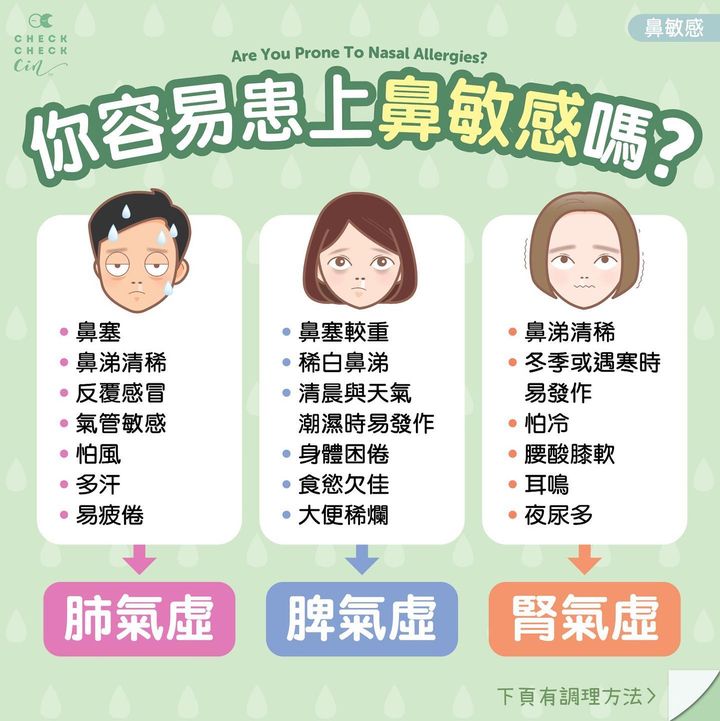June 8, 2021
【鼻無可避?】三種體虛人士要小心
⭐據知每四個香港人便有一個患鼻敏感
⭐鼻敏感人士亦比較易患上其他敏感症
#星期二提升正能量
你容易患上鼻敏感嗎?
鼻敏感是天生的嗎?未必!中醫理論中鼻敏感稱為「鼻鼽」,主要因為肺氣虛虧、衛氣失固或寒邪所致的疾病,再加上天氣或外在環境轉變影響到臟腑運作而形成,有三種體質人士比較容易患上鼻敏感,如果你有以下症狀,要注意調理一下身體啊!
??肺氣虛
症狀:鼻癢、噴嚏、鼻塞、鼻涕清稀、反覆感冒、氣管敏感、怕風、多汗、容易疲倦
調理方法:溫補肺臟,適量食用補氣食物如淮山、薯仔、人參、紅棗、鵪鶉等。
補肺防風茶療
材料:北芪9克、防風9克、白朮6克、茯苓3克、蜂蜜適量
做法:材料洗淨放入鍋中,加入1000ml水,武火煮滾後調文火煮30分鐘,連藥材倒入保溫瓶,待茶變暖後加入蜂蜜即可。此茶可反覆沖泡至味淡。建議一星期飲用2-3次。
??脾氣虛
症狀:鼻癢、噴嚏、鼻塞較重、流稀白鼻涕,清晨與天氣潮濕時易發作;身體困倦、食慾欠佳、大便稀爛等。
調理方法:補益脾胃,適量食用健脾補氣食物如白米、薯仔、淮山、蓮子、薏米、白扁豆等。
✔️CheckCheckCin米水推介:朝米水
材料:紅米、薏米、白米
功效:去水腫、消胃脹、改善面黃
??腎氣虛
症狀:鼻癢、噴嚏、流清鼻涕,症狀在冬季或遇寒時較嚴重;怕冷、腰酸膝軟、耳鳴、夜尿多等。
調理方法:補益腎氣,適量食用補腎食物如黑芝麻、黑木耳、黑豆、烏雞、核桃、栗子等。
✔️CheckCheckCin米水推介:夕米水
材料:紅米、白米、黑芝麻、黑豆
功效:補救熬夜、烏髮養腎、紓緩腰痠
留言或按讚??支持一下我們吧!❤️ 歡迎 Follow 我們獲得更多養生資訊。
Are you prone to nasal allergies?
Are people born with nasal allergies? Not necessarily! According to Chinese Medicine theories, a nasal allergy is called ‘Bi Qiu’ in Mandarin, and it is caused by weakness of the qi in the lungs, weak immune system, or the cold pathogenic factor.
The changes of the weather and environment can also further affect the functions of the organs. Individuals of these three body constitutions might develop nasal allergies more easily, so if you have the symptoms below, do seek the treatment accordingly.
??Weakness of the qi in the lungs
Symptoms: itchy nose, sneezing, stuffy nose, clear mucus, frequently getting colds, aversion to wind, excessive sweating, fatigue
Health tip: warm and nourish the lungs; consume ingredients that can nourish the qi, such as Chinese yam, potato, ginseng, red date, and quail
Tea to nourish lung and protect against wind
Ingredients: 9g astragalus root, 6g root of fangfeng, 6g bighead atractylodes rhizome, 3g poria, honey to taste
Preparation: Rinse all ingredients thoroughly. Combine all ingredients with 1000ml of water and cook on high heat for 30 minutes. Pour all contents into a thermos. Add honey after the tea has warmed. Tea can be re-brewed until flavour weakens. For best results, drink for 2-3 days a week for a treatment.
??Weakness of the qi in the spleen
Symptoms: itchy nose, sneezing, stuffy nose, runny mucus but white in color; the allergic reaction might be triggered easily during the morning or when the weather is humid; fatigue, appetite loss, and loose stools
Health tip: nourish the spleen and the stomach; consume ingredients that can nourish the qi such as rice, potato, Chinese yam, lotus seed, coix seed, and white lentils
✔ CheckCheckCin Recommendation: Dawn Rice Water
Ingredients: Red Rice, Coix Seed, White Rice
Effects: Reduces water retention. Relieves abdominal bloating. Improves yellowish complexion.
Note: Not suitable for pregnant women.
??Weakness of the qi in the kidneys
Symptoms: itchy nose, sneezing, clear mucus; symptoms would become more severe during winter or the cold season; aversion to cold, soreness from lower back to knees, tinnitus, and nocturia (excessive urination at night)
Health tip: nourish the qi in the kidneys; consume ingredients that can nourish the kidneys such as black sesame, black fungus, black beans, black-boned chicken, walnut and chestnut
✔ CheckCheckCin Recommendation: Dusk rice water
Ingredients: Red Rice, White Rice, Black Sesame, Black Soya Bean
Effects: remedy to frequent late nights, improve hair quality and nourish kidneys, relieve sore lower back
Welcome to order through our website: www.checkcheckcin.com
Comment below or like ?? this post to support us. ❤️ Follow us for more healthy living tips.



